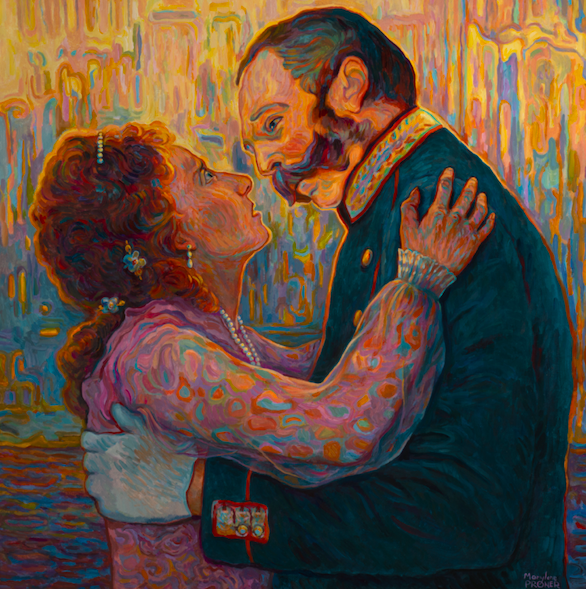
Princess Yurievskaya (née Catherine Dolgorukova) was the mistress of Tsar Alexander II and later became his wife in a morganatic marriage after the death of the Empress in 1881. Catherine’s father died when she was young, leaving no resources, so it was necessary for her to attend a school for well-born destitute girls supported by the Tsar. At a routine inspection of the school in 1864, the Tsar met Catherine and was immediately smitten. It had been a sad and stressful time for both of them: Catherine, who had lost her father and was penniless, and the Tsar, who had suffered both the death of his son Nicholas, the Tsarevich, and concurrent loss of conjugal relations with the Empress on medical advice due to her tuberculosis. The pair met and were immediately and wildly wrenched out of their depression by falling madly in love. Catherine had liberal leanings and encouraged the Tsar to continue his Russian reforms, begun after his coronation with the freeing of the serfs.
The orchestral symphonic poem, Princess Yurievskaya, begins with Catherine (violin solo) as a happy young girl (Allegretto festuso) who finds her gifts as a woman (Vivace slancio, Maestoso trionfale). With the death of her father, she falls into despair (Allegretto dolente) and eventually finds a life for herself in the Smolny Institute for Noble Maidens (Prestissimo deciso). Alexander (cello solo) became Tsar with his coronation (coronation march, Largretto serioso) in 1855 and, troubled by the plight of the serfs (Allegro con doloroso), frees them (Dance of the Serfs Presto animato). His reign was mostly untroubled (Allegro nobilimente) when he suffered two nearly simultaneous tragedies with the death of the Tsarevich and the withdrawal of relations of the Empress. His meeting with Catherine at an inspection of her school lifts them both out of despair (Andante con dolore) and they find themselves hopelessly in love and passionately “attacking each other like cats” (Allegro appassionato).
Catherine and the Tsar remain blissfully in love, producing three healthy children (Tempo di Valse Viennese). Clouds gather over their happy life together, however, as reactionary forces gather in Russia with several unsuccessful assassination attempts on the Tsar. The Empress dies of her tuberculosis and the Tsar, as promised, marries Catherine giving legitimacy to her children and to her he awards the title Princess Yurievskaya. As rumors of another assassination plot swirl about the Winter Palace, Princess Yurievskaya becomes frantic about the danger of the Tsar’s plans for a marshal parade. As she desperately pleads with him not to go, the Tsar attempts to reassure her.
Finding her inconsolable, he at last takes the Princess into his arms and lifting her onto a table makes love to her. The Tsar then leaves the palace for the parade and shortly thereafter one bomb and then another are hurled at his carriage. The Tsar, mortally wounded, is carried back to the Winter Palace and placed in the foyer where the Tsarevich, Alexander III, and his son, the young Nicholas, stand grief-stricken as Princess Yurievskaya descends the stairs still in the white night gown that she had worn making love to her beloved husband. Realizing to her horror what has happened, she crouches and speaks to the Tsar. On hearing him utter his last words and taking his last breath, she throws herself on his broken body (Presto agito).
In June 2011, John Gottsch’s debut album – featuring Princess Yurievskaya and another SFSO World Premiere, Sunset – was released by Naxos Records, the world’s leading classical music label. The recording is performed by Maestra Sebrina Alfonso and South Florida Symphony Orchestra. The works were recorded at Nova Southeastern University’s Rose and Alfred Miniaci Performing Arts Center on March 10-11, 2020 — just days before the world “shut down.” The album is available for purchase now: https://www.naxos.com/catalogue/item.asp?item_code=8.559901